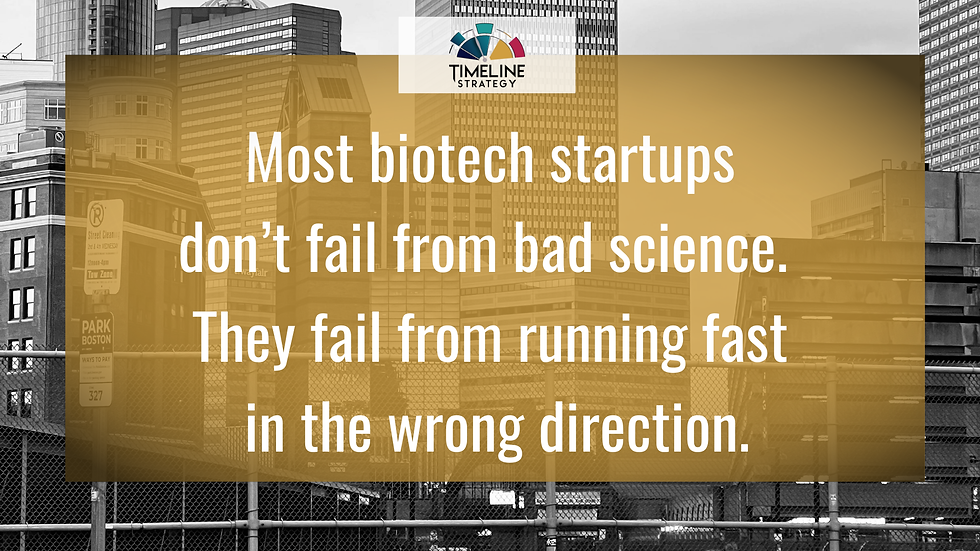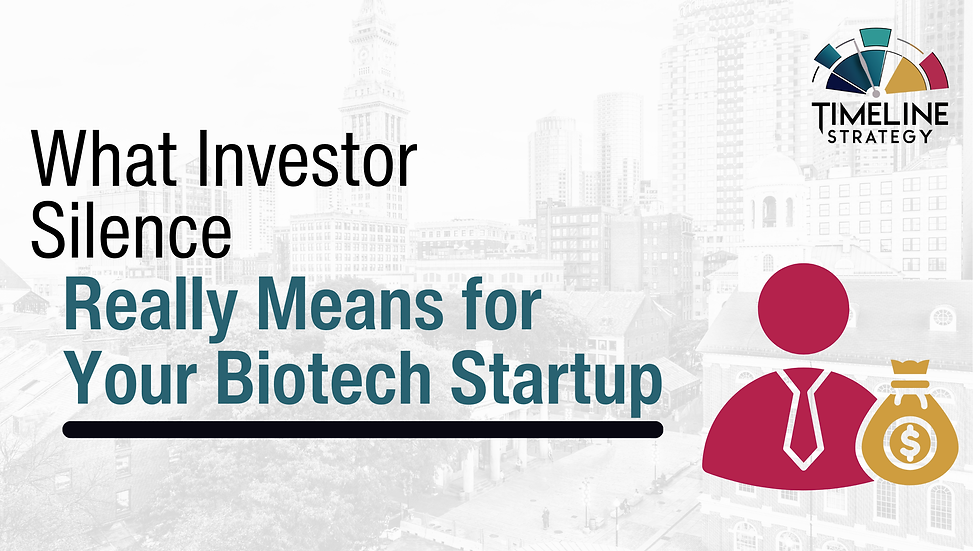Strategy Before Tactics: The Step Most Biotech Startups Skip
- Attila Foris

- Sep 3, 2025
- 6 min read
Biotech founders are doers by necessity. The clock is ticking, the science is demanding, and the runway is already shrinking.
Pitch decks, early hires, partnership conversations they all feel urgent, and moving quickly feels like progress. But urgency without direction isn’t progress. It’s drift.
👉 Early-stage biotech doesn’t fail because founders lack ambition. It fails because too many teams mistake tactical motion for strategic clarity. They jump into execution before anyone has paused to define where the company is actually heading, what milestones truly matter, and what should be left behind.
The result is predictable: fragmented roadmaps, conflicting narratives, and resources scattered across every shiny opportunity. Founders spend months working harder and faster, yet the startup remains stuck in place busy, but not moving forward.
👉 This is the silent trap of early biotech startups. And it almost always starts with one skipped step: the strategy workshop.

The Illusion of Progress in Biotech Startups
👉 For most biotech founders, momentum feels like the only currency that matters. The runway is shrinking, the science is demanding, and investors keep asking for “traction.” So the instinct is to move as fast as possible. Draft the deck. Call potential partners. Make the first hires. It all feels urgent, and it feels like progress.
But in reality, not every form of motion is progress. A partnership call without a strategic anchor is just a distraction. A hire made before defining what needs to be unlocked is overhead, not leverage. Even the most polished pitch deck collapses if the story changes every time you meet a new investor.
👉 The deeper issue is that urgency often masks misalignment. Teams convince themselves they are advancing simply because everyone is busy. Scientists push for more data. CEOs chase funding. Business leads experiment with GTM ideas. Each effort makes sense on its own, but without a shared framework, these paths diverge instead of converging.
This is how biotech startups burn time without realizing it. They don’t fail because the science doesn’t work. They fail because they confuse tactical activity with strategic clarity. And by the time they notice, pulling the team back into alignment costs far more than the 45 minutes they thought they were saving.
Why Biotech Startups Treat Strategy as Optional
In the early stages, many biotech founders convince themselves that strategy can wait. The lab work is overwhelming, the capital race is relentless, and tactical wins feel like the fastest way to show progress. But that mindset is exactly what traps teams in reactive mode.
👉 Here are the most common reasons biotech startups skip the strategy step:
✅ Science feels like enough: Progress in the lab is taken as proof the company is moving forward, even if there’s no clarity on the business path.
✅ Investors demand traction, not frameworks: Founders rush to produce visible milestones, thinking a better deck or one more dataset will substitute for a coherent direction.
✅ Time feels too scarce for reflection: With only 12–18 months of runway, stopping for strategy feels like a luxury, not a necessity. Ironically, this is how months disappear without real alignment.
✅ The myth of “later”: Teams tell themselves they’ll figure out strategy after the next funding round or milestone. But by then, misalignment has already hardened into culture.
👉 The truth is, strategy is never optional in biotech. Without it, every new hire, every BD call, and every experiment is a gamble without context.
With it, even limited resources can be focused, sequenced, and explained in a way that builds trust and momentum.

The Hidden Cost of Skipping Strategy
At first, skipping strategy doesn’t feel dangerous. The team is busy, experiments are running, meetings are happening. On the surface, everything looks fine. But underneath, cracks begin to spread.
Without a shared direction, co-founders start pulling in different ways.
One pushes for more scientific depth, another for faster commercial validation. Neither is wrong, but without alignment, their energy cancels out rather than compounds.
Investors notice this too. A shifting story erodes credibility. One month you are a platform company, the next you are product-driven. A deck that changes with every meeting signals not agility but confusion.
👉 Biotech investors don’t expect certainty, but they do expect consistency in how you frame the opportunity.
Meanwhile, the runway quietly burns. It’s rarely one catastrophic mistake that sinks a biotech startup.
👉 More often, it’s dozens of tactical decisions made without context, the extra hire that didn’t unlock anything, the pilot project that ate three months, the partnership conversation that distracted the whole team.
👉 Each feels small at the time. Together, they consume the company’s most precious resource: time.
The hidden cost of skipping strategy is not just wasted effort. It’s the erosion of trust inside the founding team, with investors, and with potential partners.
Once that trust is gone, no amount of scientific progress can repair the foundation.
How a 45-Minute Strategy Workshop Changes the Game
The idea of a “strategy workshop” often sounds like a luxury to founders running on limited capital and relentless pressure. But in practice, a short, focused session can be the most cost-effective investment a biotech startup ever makes.
In just 45 minutes, the conversation shifts from scattered activity to aligned intention. The founding team steps back and asks the hard questions:
What does success actually look like in the next six months?
Which milestones matter to investors and the market, not just to the lab?
What can we confidently cut so that the company moves faster, not busier?
This isn’t about generating another slide deck. It’s about creating a decision filter.
After the workshop, every choice, a new hire, an experiment, a BD call, is weighed against the agreed direction. If it doesn’t move the company closer to the defined milestones, it doesn’t get priority.
👉 The effect is immediate. Tension between co-founders eases because everyone knows what the company is actually aiming for. Investor conversations improve because the story is consistent and believable. Even small tactical wins start to compound because they build toward the same outcome rather than scattering the team’s energy.
👉 Most importantly, a strategy workshop replaces drift with momentum. Instead of being pulled by urgency, the startup begins to be led by clarity. And in biotech, clarity is the scarcest and most valuable resource of all.
From Chaos to Clarity: Embedding Strategy in Daily Decisions
👉 A one-off workshop can create alignment, but the real value comes when strategy stops being an event and becomes a habit. Biotech startups thrive when strategic clarity shapes everyday choices. It’s not about writing a 5-year plan.
It’s about building a living framework that keeps the team focused even as the science, funding, and market shift.
👉 When founders embed strategy into daily decisions, they create a simple but powerful filter. Every action is tested against the same baseline:
Does this move us closer to our defined milestones?
Does this reinforce the story we are telling investors and partners?
Or is it noise disguised as progress?
Here’s how strategy shows up in practice for successful biotech startups:
✅ Hiring: Roles are defined by the specific milestones they unlock, not by generic job descriptions.
✅ Investor conversations: The pitch stays consistent, because the narrative is anchored in strategy rather than improvised for each meeting.
✅ Scientific focus: Experiments are chosen for their strategic value, not just their scientific interest.
✅ Partnerships: Business development isn’t about chasing every opportunity. It’s about pursuing the ones that reinforce the core direction.
The founders who learn to apply this filter consistently don’t just move faster. They move with purpose.
👉 And in biotech, where time is unforgiving and capital is scarce, that difference often determines who scales and who stalls.
Final Thought: Strategy as the Starting Point for Success
Biotech startups don’t fail because their science is weak. They fail because they run hard without direction. Tactics without strategy feel like progress, but in reality they burn trust, capital, and time.
👉 The fix isn’t another accelerator, a bigger deck, or one more data set. It’s stopping long enough to ask the right questions, align as a team, and set a clear course. That’s what a strategy workshop does.
It takes just 45 minutes.
But those 45 minutes can define whether your biotech startup drifts into obscurity or builds the momentum it needs to reach the next inflection point.
Ready to Break Your Bottlenecks?
If you're feeling the friction — indecision, misalignment, slow momentum — it's not just operational. It's strategic.
Attila runs focused strategy consultations for biotech founders who are ready to lead with clarity, not just react to pressure. Whether you're refining your narrative, making tough tradeoffs, or simply feeling stuck, this session will get you unstuck — fast.





Comments